This midsize crossover’s fuel economy ratings have fluctuated over the years, but it has maintained a consistent combined mpg. We break down the evolution of the Ford Edge’s fuel consumption.
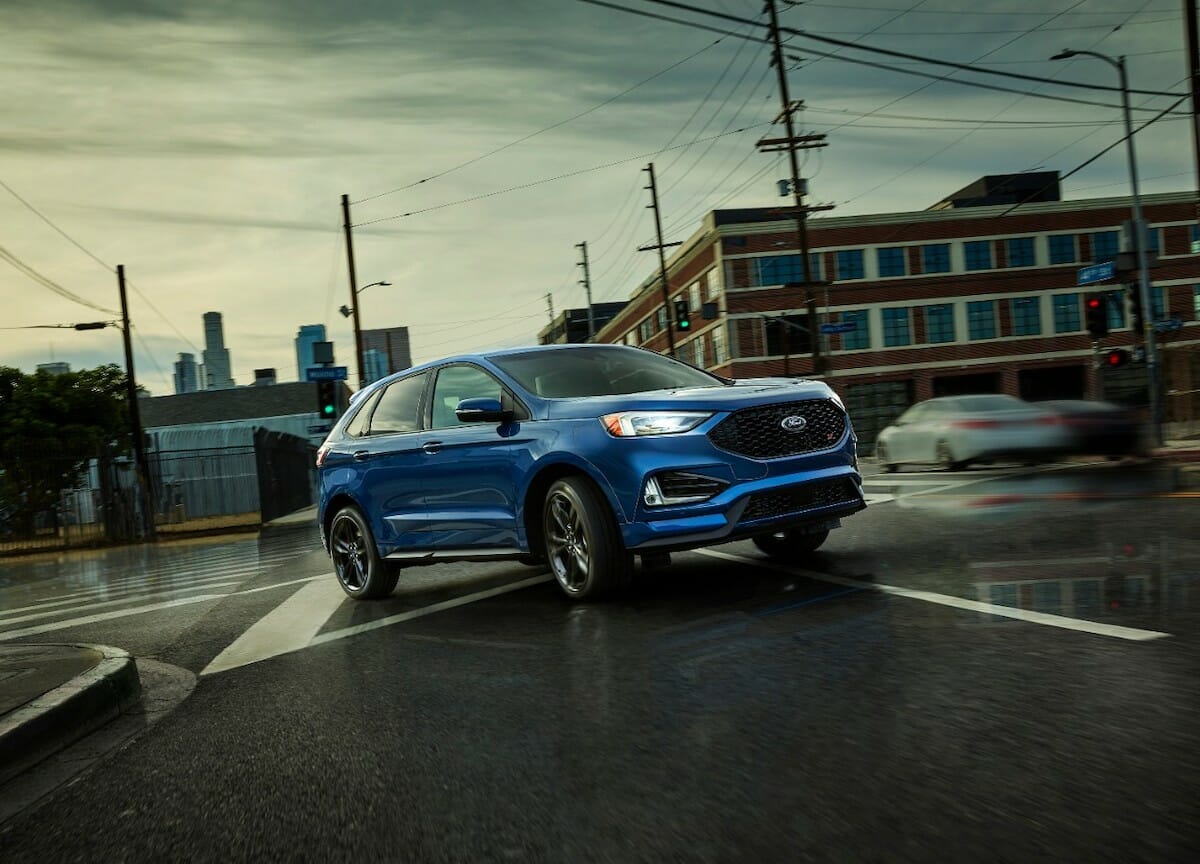
The Ford Edge is a midsize Crossover Utility Vehicle (CUV) that is larger than the Ford Escape and smaller than the Ford Explorer. Ford Motor Company has manufactured the Edge since 2007 and outfitted it with a wide range of drivetrains—though never as a hybrid.
Since 2011, Ford has offered the Edge with a 122 ci (2.0L) EcoBoost I4. The front-wheel-drive (FWD) Ford Edge powered by the 2.0L I4 is the most fuel-efficient configuration of the CUV.
Some early years of the I4 Ford Edge boast the best highway fuel economy of the model’s run. Ford Edges from 2019 and later make up for a slight dip in highway mpg with unprecedented city mpg, thanks to an eight-speed transmission and Auto Start-Stop engine technology.
The result is that the FWD I4 Edge has maintained an EPA-rated, combined city/highway fuel economy rating of 24 mpg for a decade.
All-wheel-drive (AWD) Ford Edges lose at least one mpg of fuel economy. Drivers willing to sacrifice several more mpgs of fuel efficiency have opted to upgrade their Ford Edge with one of several powerful Duratec and EcoBoost V6 engines available throughout the vehicle’s history. Every successive generation of V6-powered Ford Edges is more fuel-efficient than the last.
Notably, the 2015 Ford Edge Sport received an EcoBoost powerplant: a 2.7L turbocharged V6. The resulting 2015 to present Ford Edge Sports boast excellent acceleration and fuel mileage.
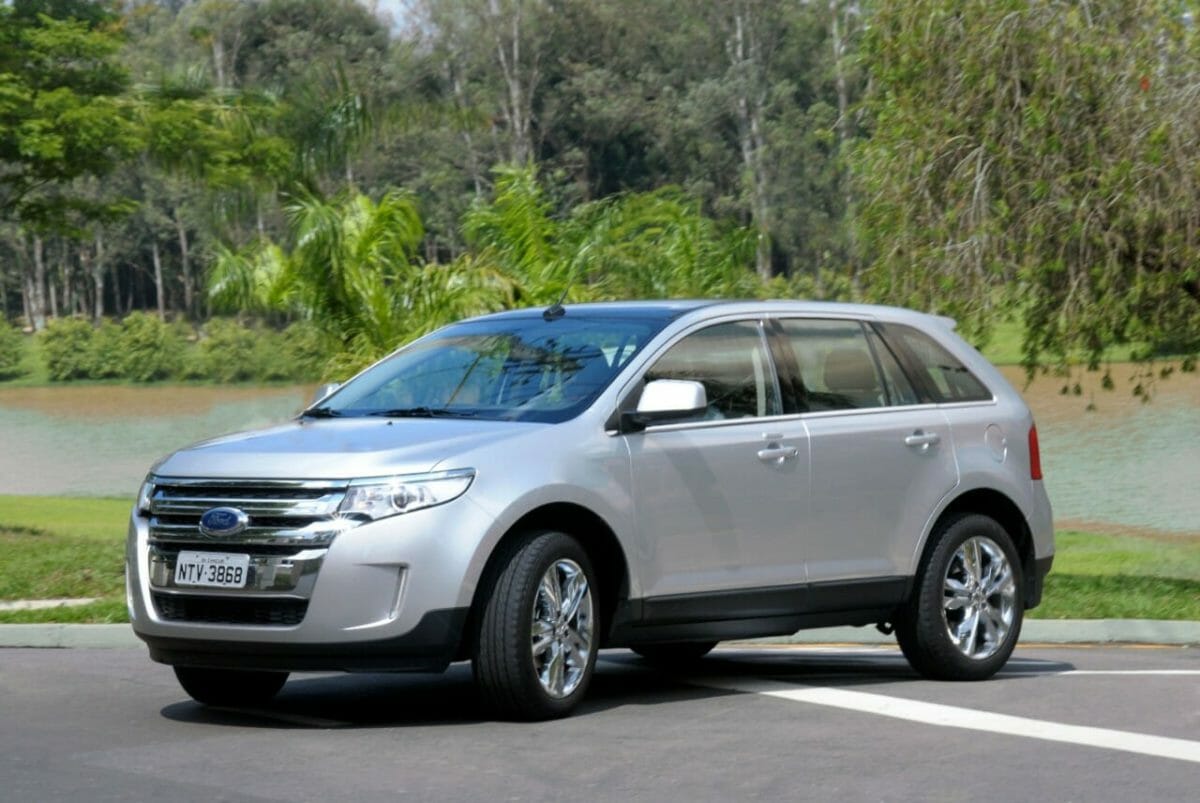
Ford’s V6-only First-generation Edge (2007-2011)
Ford Motor Company launched the 2007 Ford Edge to critical acclaim. The Automobile Association of America and Parents Magazine listed the Ford Edge among their “Best Cars for Families.”
The vehicle also won J.D. Power and Associates’ 2007 Performance Award. Finally, the Insurance Institute for Highway Safety awarded Ford’s new CUV a “Top Safety Pick” rating.
Every early Ford Edge shipped with the 213.3 ci (3.5L) Duratec V6 engine and a 6F50 six-speed automatic transmission. The Blue Oval’s engine choice endowed the Edge with 265 hp at 6,250 rpm and 250 lb.-ft. of torque at 4,500 rpm.
But fuel mileage was not this early Ford Edge’s strong suit. The EPA rated the fuel economy of the first FWD, V6-powered Ford Edge at 16 city/23 highway mpg (19 combined). The AWD Edge could only claim 16 city/22 highway mpg (18 combined).
As Ford engineers fine-tuned the new drivetrain, the Ford Edge’s fuel mileage increased: the 2008 FWD Edge offered 16 city/24 highway mpg (19 combined); then the 2009 FWD Edge achieved 17 city/24 highway mpg (19 combined); finally, the 2010 FWD Edge won a rating of 18 city/25 highway mpg (20 combined).
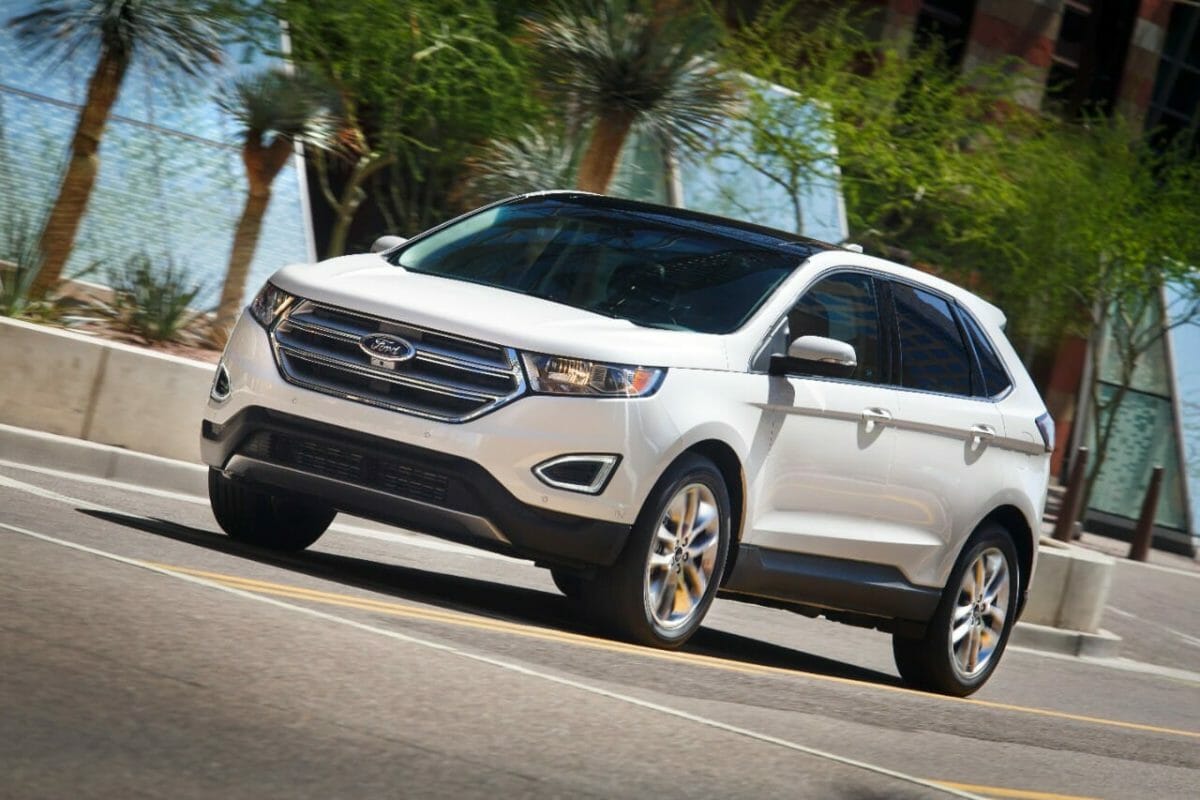
More Engine Options for the Ford Edge (2011-2015)
The 2011 model year saw a mid-cycle revamp of the Ford Edge. The 2011 Ford Edge benefited from a dramatic facelift, an upgraded touchscreen and several new powerplants. The 2011 retune increased the Ford Edge’s 3.5L V6’s hp to 285.
The same year, Ford offered its Edge buyers two more engine choices: A 227 ci (3.7L) Duratec V6 and a 122 ci (2.0L) EcoBoost I4. At the same time, Ford continued to improve the fuel mileage of the 3.5L V6-equipped Edge. 2011 FWD 3.5L Edges earned a rating of 19 city/26 highway (21 combined); in 2012, 2013, and 2014, the 3.5L Edge achieved 19 city/27 highway mpg (22 combined).
The 3.5L V6 available at the launch of the Ford Edge was the first iteration of the Blue Oval’s “Cyclone” engine family. The 3.7L V6 available in the redesigned 2011 Ford Edge Sport was a “Cyclone” V6 with a stroke identical to its 3.5L brother (3.41 inches of piston travel) and an increased bore diameter to achieve a displacement of 3.7L. This stout 3.7L V6 powers many Mustangs, F-150s, and Mazdas.
In the Ford Edge Sport, the 3.7L V6 turns out 305 hp and 280 lb.-ft. of torque. The resulting crossover can do zero to 60 mph in just 6.9 seconds and zero to 100 mph in 19 seconds. Its quarter-mile time is 15.4 seconds at 91 mph. This top-trim CUV is even rated to tow 2,000 lbs. Car and Driver dubbed the vehicle “surprisingly satisfying.”
But the 3.7L V6 did some damage to the Ford Edge Sport’s fuel mileage. The EPA rated the FWD 2011 Ford Edge Sport at 18 city/25 highway mpg (20 combined). The 2012 and 2013 models achieved 19 city/26 highway mpg (21 combined) ratings. The 2014 Sport maintained the 21 combined rating, though both city and highway ratings would lose one mpg.
To reduce its fleet-wide fuel economy, Ford Motor Company pioneered reliable and hassle-free turbocharged engines. Over a dozen turbocharged, direct-injection gasoline engines from the Blue Oval have carried the EcoBoost name.
To achieve performance on-par with a naturally aspirated V6, Ford outfitted its new 2.0L I4 EcoBoost with twin independent variable camshaft timing and a turbocharger.
Motor Trend commented, “At speed, depressing the gas pedal delivers a linear surge of power that’s difficult to discern from the Edge’s…3.5L V6.” The resulting crossover also achieved nearly 30 mpg on the highway: the 2.0L Edge received a 21 city/29 highway mpg (24 combined) rating in 2012, 2013, and 2014. Ford did not offer a 2.0L I4 in the AWD Edge until 2015.
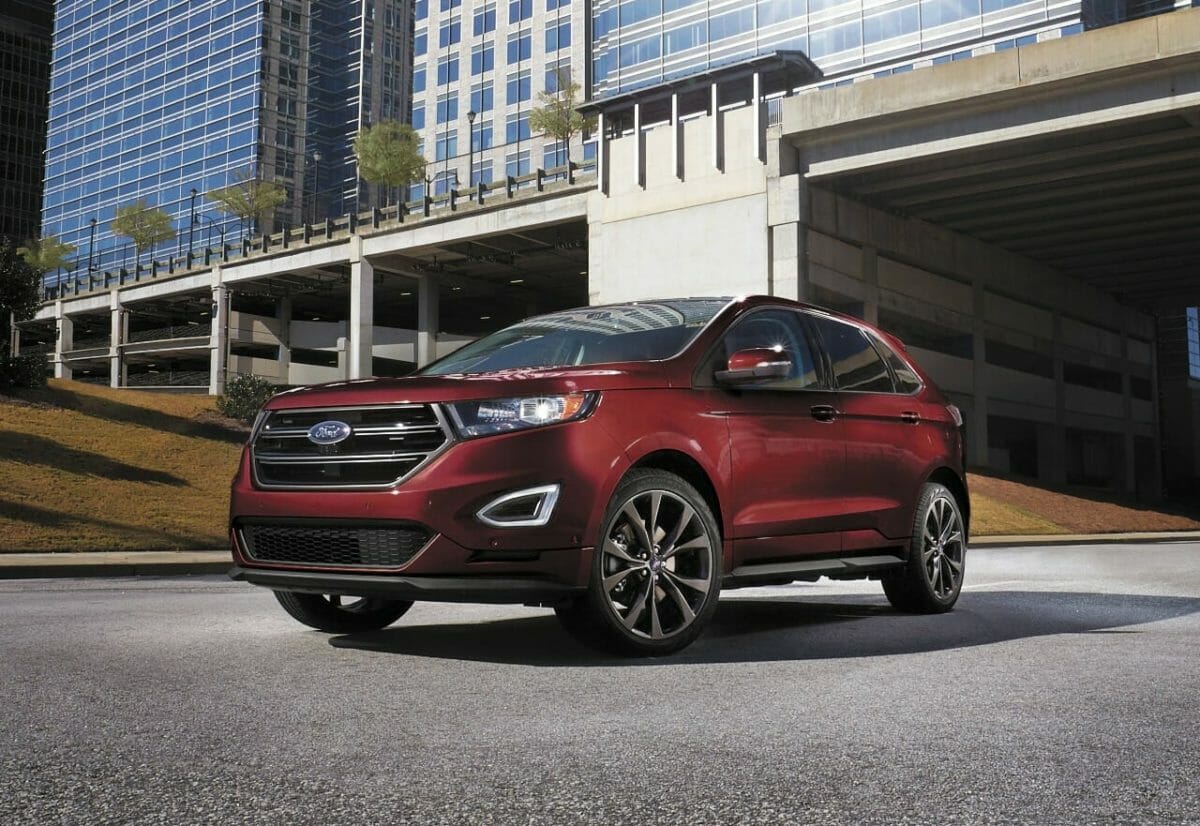
Second-generation (2015-2018)
Ford redesigned its 2015 Ford Edge from the ground up. The Ford engineers built the revamped CUV on their global CD4 platform—just like the midsize Fusion sedan—resulting in a lighter, nimbler vehicle.
The second-generation Edge benefits from a wheelbase stretched by one inch, overall length stretched by almost four inches, and 5.5 cu. ft. of additional interior volume. Thanks to more high-strength steel than used in the first-generation Edge, the 2015 CUV holds corners better, with bending stiffness increased 26 percent and torsion rigidity increased 16 percent.
Simultaneously, the 2015 Edge shed weight: while the first-generation Edge weighs in at 4,291 lbs, the second-generation tips the scales at just 3,912 lbs. To complement the new chassis, Ford developed a new line of powerplants, including a redesigned 2.0L EcoBoost I4.
This new, lightweight crossover boasts the highest highway fuel mileage ratings of any Ford Edge to date. In 2015 and 2016, the FWD Edge powered by a 2.0L EcoBoost achieved an EPA rating of 20 city/30 highway mpg (24 combined). In 2017 and 2018, the Edge’s highway mpg rating dropped by one mile, while its city and combined ratings remained the same.
For the second generation of the Edge, Ford finally paired its AWD drivetrain and 2.0L EcoBoost, with excellent results. The AWD 2.0L Edge achieved highway fuel mileage ratings only two miles per gallon behind its FWD brother: 20 city/28 highway mpg (23 combined) in 2015 and 2016, then dropped to 20 city/27 highway mpg (23 combined) in 2017 and 2018.
Customers seeking even better fuel economy around the town could opt for Ford’s Auto Start-Stop technology in their second-generation Edge.
CUVs outfitted with this technology automatically shut off the engine while parked at a red light and then fire the engine back up when the driver releases the brake pedal. Start-Stop enabled the Edge to gain an entire mpg on its city fuel economy rating but cost one mpg on the highway rating, thus maintaining the same combined rating. By 2018, Start-Stop technology came standard on every 2.0L Ford Edge.
The naturally aspirated 3.5L V6 soldiered on as the mid-trim powerplant for the second-generation Ford Edge. 3.5L Edges trailed at least four mpg of highway mileage and two mpg of city mileage behind the 2.0L Edges. The FWD 3.5L Ford Edge was rated at 18 city/26 highway mpg (21 combined) in 2015 and 2016, then fell to 17 city/26 highway mpg (20 combined) in 2017 and 2018.
The 3.5L powerplant handled the Edge’s AWD chassis well: the 2015 and 2016 AWD 3.5 L Edges received a mileage rating of 17 city/24 highway mpg (20 combined); then the 2017 model maintained the previous city/highway ratings while its combined rating fell to 19 mpg; and finally, the 2018 edition dropped further to a 17 city/23 highway mpg (19 combined) rating.
The 2015 Ford Edge Sport received its own EcoBoost powerplant: The top-trim engine became the venerable 166 ci (2.7L) turbocharged EcoBoost V6. Despite the decreased displacement, the turbocharged engine produced 315 hp and blasted the Edge Sport into a new performance class with a 5.9 second zero to 60 time.
Car and Driver proclaimed that the new Edge Sport could “rocket down freeways and stomp the unsuspecting when the light turns green.” Despite thrilling acceleration, the Edge Sport achieved respectable fuel mileage.
The Edge Sport was available as a FWD vehicle until 2015; that year, the EPA awarded it an 18 city/27 highway mpg (21 combined) fuel economy rating. The AWD Edge Sport garnered a 17 city/24 highway mpg (20 combined) rating from 2015 thru 2018.
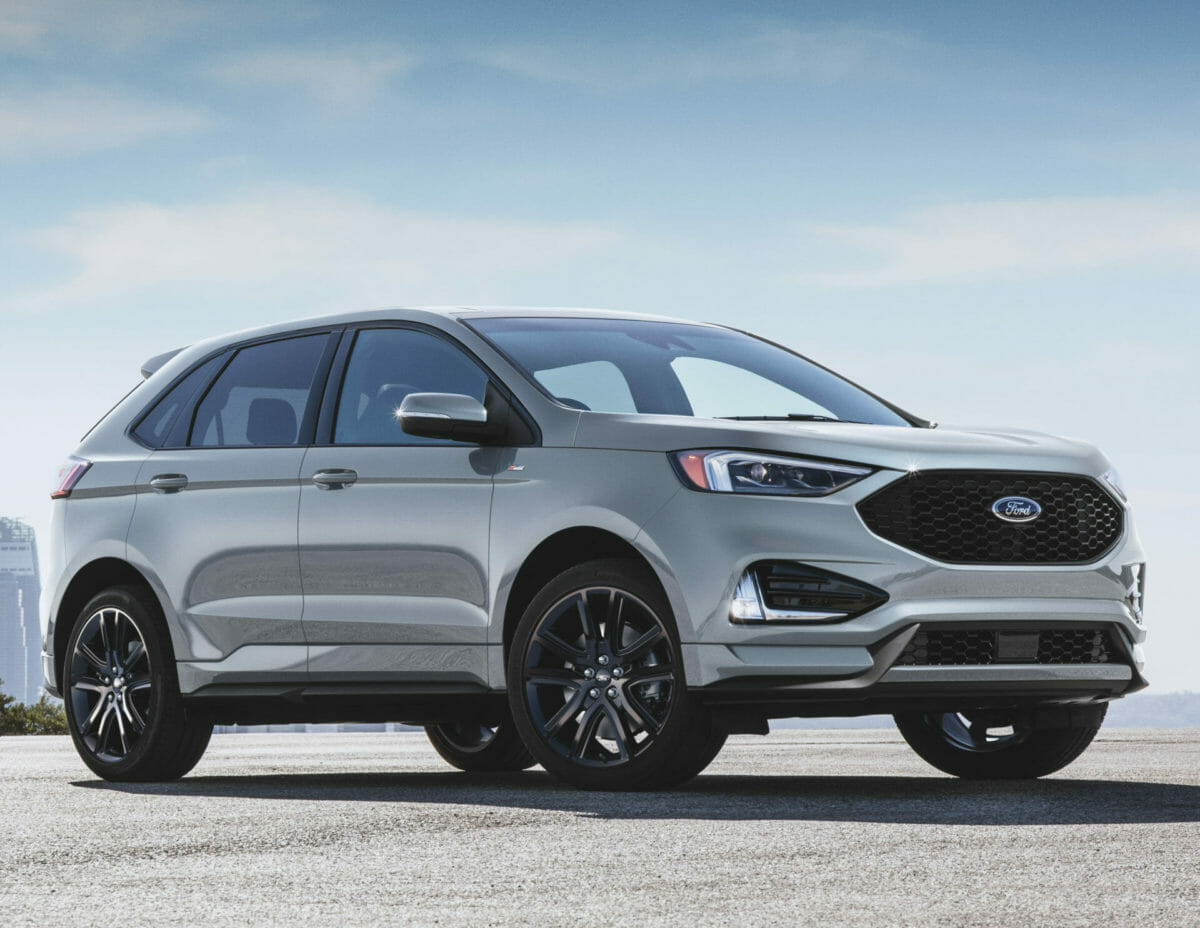
Second-generation Facelift (2019-present)
The most recent significant change to the Edge was its 2019 midcycle redesign. The 2019 Ford Edge redesign included a major facelift, a premium grille inspired by the Ford Explorer, and a high-end Bang & Olufsen sound system.
In addition, Ford made its eight-speed transmission and Auto Start-Stop technology standard on every Edge model. The 2019 Ford Edge can claim the model’s best city/highway combined mpg to date.
Ford finally retired the 3.5L V6 after over a decade of service. The FWD 2019 Edge was only available with a 2.0L EcoBoost turbocharged engine. The 2019 FWD model won an EPA fuel economy rating of 22 city/29 highway mpg (25 combined). The FWD Edge’s combined mileage rating slipped to 24 for the 2020 and 2021 model years.
Ford also fitted AWD Edges with its 2.0L EcoBoost engine for 2019, 2020, and 2021 model years; these models all received a 21 city/28 highway mpg (23 combined) fuel economy rating.
The redesigned Edge Sport (rebadged as the Ford Edge ST) continued to feature a turbocharged 2.7L V6—mated to the new eight-speed automatic—in an AWD chassis. The retuned 2.7L could claim 335 hp while maintaining excellent fuel mileage.
The 2019 and 2020 Ford Edge STs earned 19 city/26 highway mpg (21 combined) fuel economy ratings. The 2021 Edge ST’s highway mileage rating dropped to 25 mpg while its city and combined ratings remained the same.
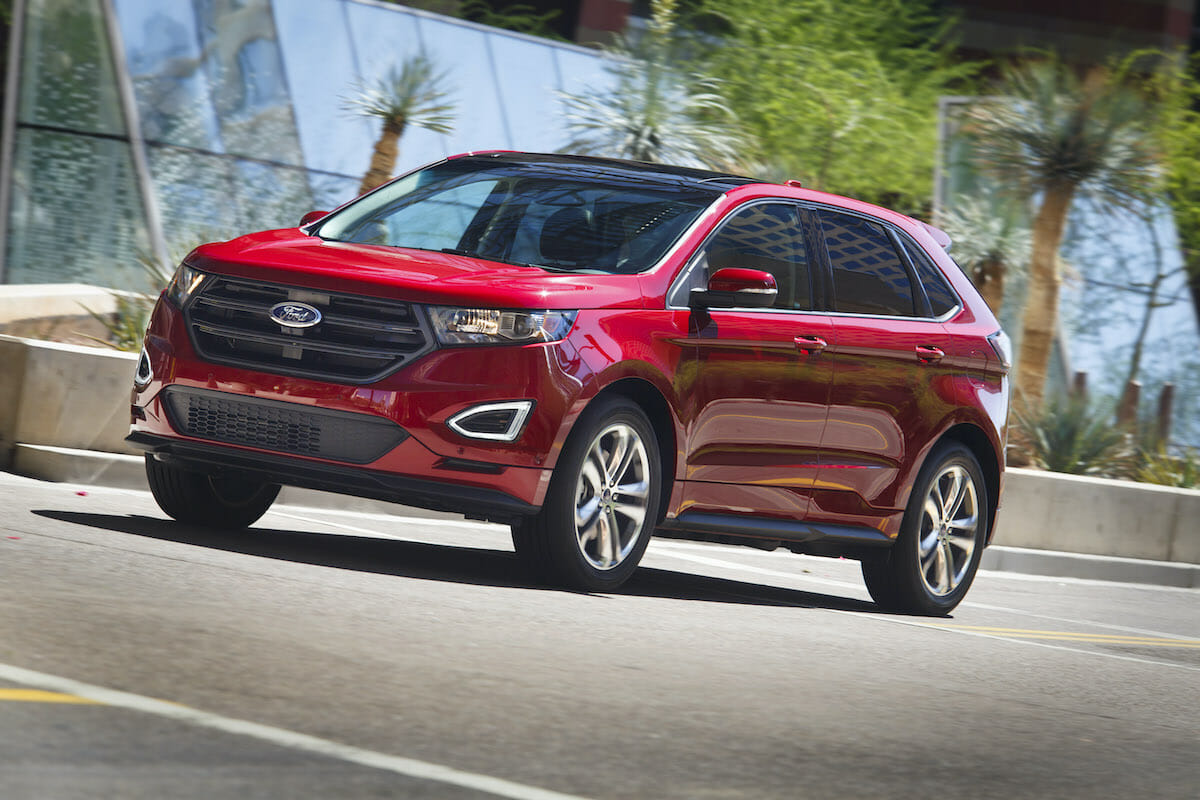
Ford Edge Fuel Economy Overview
The Edge CUV benefits from the Ford Motor Company’s investment in reliable, fuel-efficient, EcoBoost turbocharger technology. The most fuel-efficient Ford Edge (the FWD I4 model) has maintained a 24 mpg combined city/highway fuel efficiency rating for a decade.
Owners of comparable hybrid drivetrains may face expensive battery pack replacement down the road. But by achieving segment-leading fuel economy through small, turbocharged engines, the Edge has proven itself as a powerful and reliable Ford crossover. It is no wonder that the Ford Edge is a favorite CUV of American drivers.
Photos: Ford